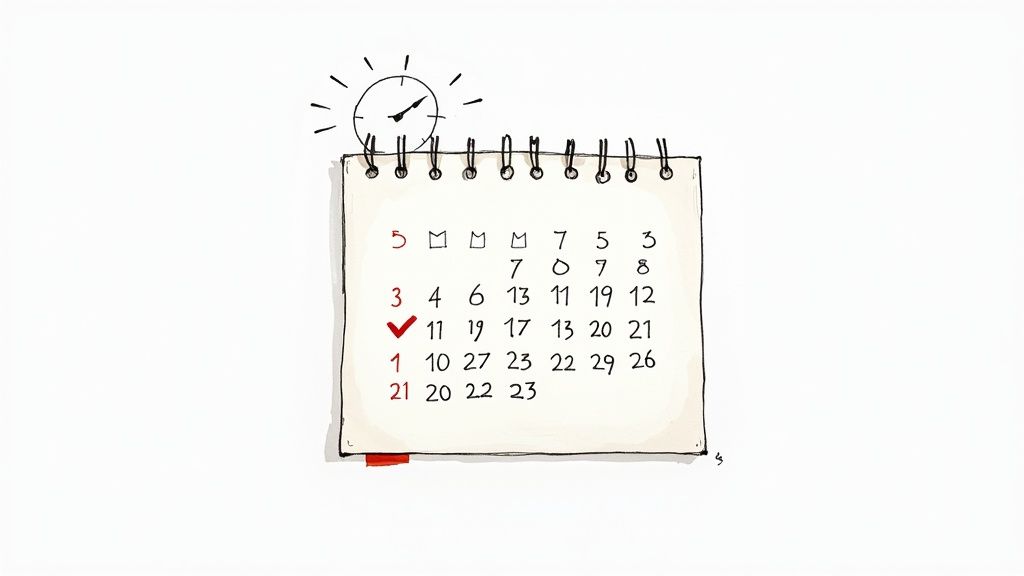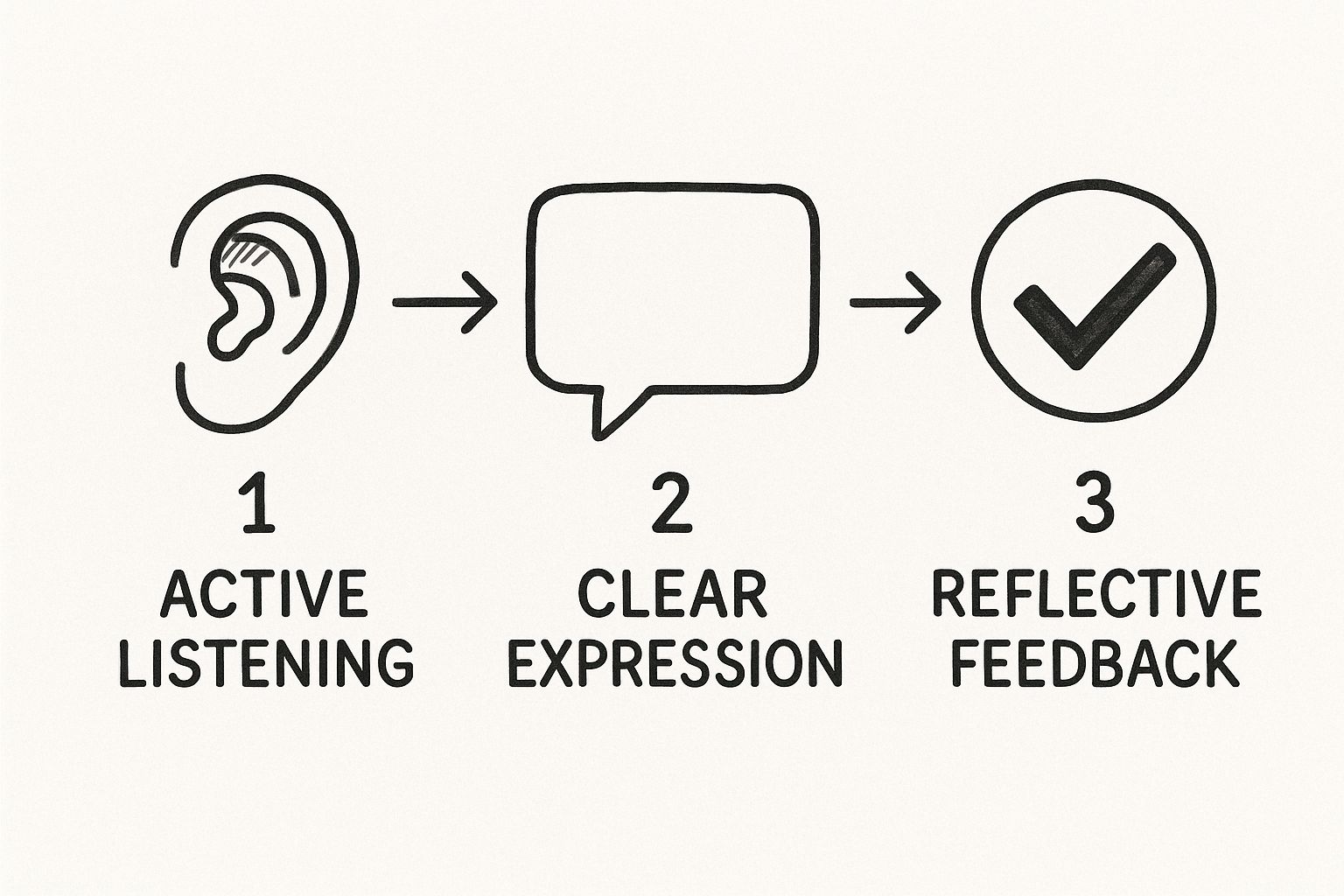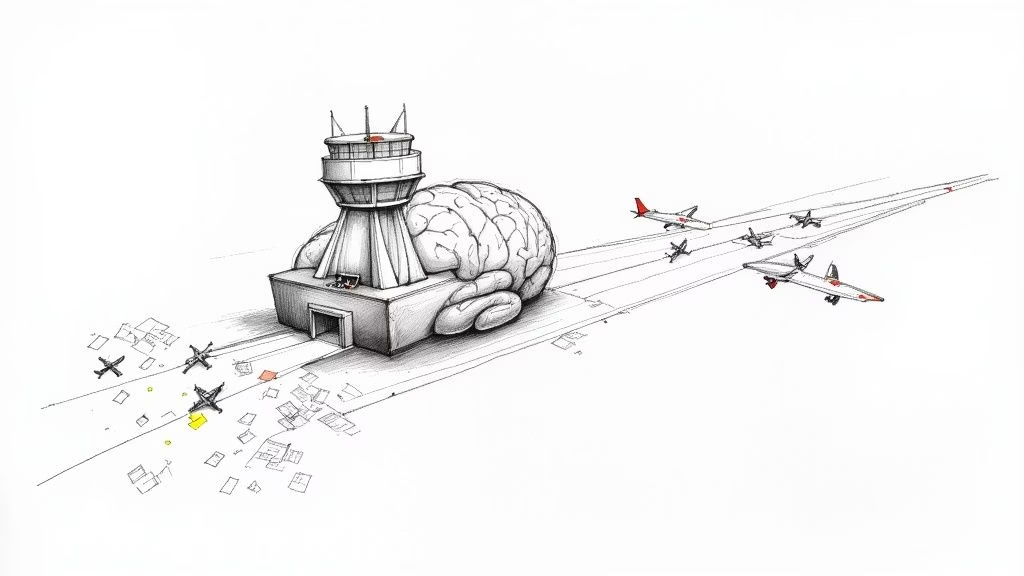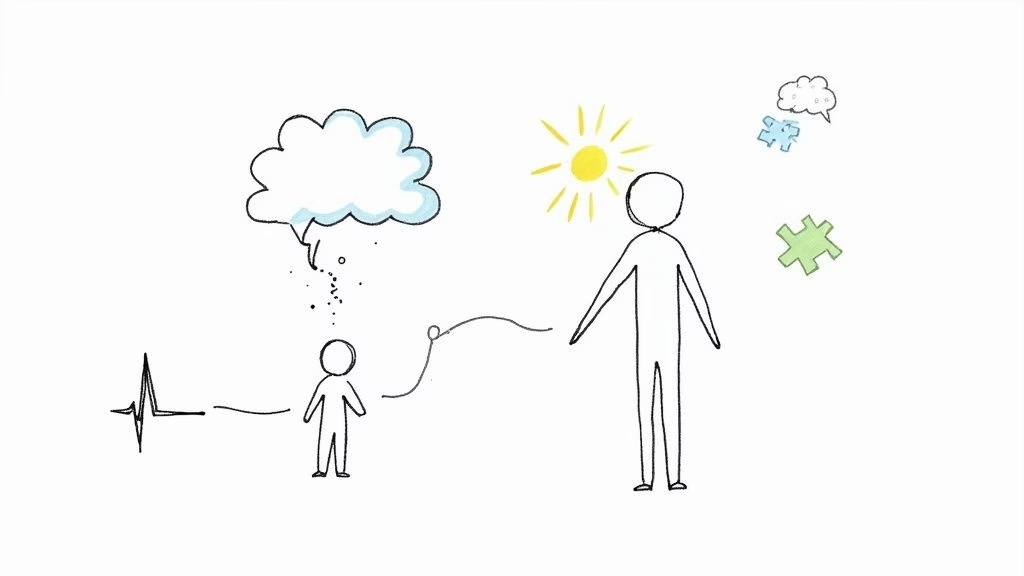When we talk about essential life skills for high school students, we're looking beyond what's taught in the classroom. This isn't about calculus or chemistry; it's about financial literacy, emotional resilience, and the basics of independent living. These are the real-world tools that help teens build a future that feels capable, confident, and a lot less anxious.
Why Life Skills Are More Important Than Ever

High school has become a pressure cooker, laser-focused on grades, test scores, and stacking up extracurriculars for college applications. And while that's all important, this academic grind often pushes the most practical skills to the side—the very skills teens will need the second they step out on their own.
Think of it this way: academics give you the map, but life skills are the power-ups you need to actually navigate the journey. Skills like managing money, handling stress, and communicating well are the foundation of a stable, successful adulthood. Without them, even the most academically gifted students can feel lost and completely overwhelmed when they finally leave home. It's critical to understand the changing landscape for Gen Z if we want to truly support them.
The Growing Demand for Practical Knowledge
We're hearing it more and more from recent graduates: high school didn't prepare them for real life. This isn't just a feeling; the numbers back it up.
A recent Quizlet survey found that about one-third of young adults lack confidence in their financial and core life skills. It also revealed that a whopping 68% of graduates believe that practical, non-academic courses would have better prepared them for what was to come. That’s a huge number of young people telling us something is missing.
To really see what's on their minds, here's a breakdown of the skills recent graduates feel they missed out on most:
Top Life Skills High School Graduates Wish They Had Learned
| Skill Area | Why It's Critical | % Feeling Unprepared |
|---|---|---|
| Financial Literacy | Managing budgets, understanding taxes, and building credit are non-negotiable for adult life. | 49% |
| Career Preparation | Navigating job applications, interviewing, and understanding professional etiquette are key to landing a first job. | 39% |
| Personal Well-being | Developing healthy habits for mental and physical health is the foundation for long-term success. | 33% |
| Communication & Networking | Building relationships and advocating for oneself are vital skills in both personal and professional settings. | 29% |
This table makes it crystal clear—the skills gap isn't just about doing laundry. It's about fundamental abilities needed to function independently.
This isn’t just about balancing a checkbook. It's about building the resilience to bounce back from failure, fostering mental wellness in a stressful world, and cultivating strong interpersonal abilities. In fact, improving communication skills is one of the most powerful things a high school student can do to set themselves up for success in every area of life. improving communication skills
Supporting Teens in a Complex World
For parents, the goal has always been the same: raise independent, capable adults. Today, that means creating opportunities for your teen to make their own decisions, handle real responsibilities, and learn from their mistakes—all while knowing you have their back.
By focusing on these essential life skills, we're not just preparing them for a test. We're giving them the tools they need to face whatever comes next with true competence and confidence.
Building a Strong Financial Foundation
Let's be real, talking about money can feel weird and complicated. But it doesn't have to be. For high schoolers, getting a grip on the basics of finance is one of the most empowering things you can do for your future self. It’s less about boring math and more about learning the rules to a game you’ll be playing for the rest of your life.
The whole point is to take the mystery out of money by breaking it down into simple, manageable pieces. This isn't about becoming a Wall Street wizard overnight. It’s about building small, smart habits right now that will pay off in huge ways down the road.
Budgeting Made Simple: The 50/30/20 Rule
One of the simplest ways to get started with managing your money is the 50/30/20 rule. It’s a super straightforward guide that shows you exactly where your cash is going, no complex spreadsheets required. It's perfect for handling money from your first job or even just your allowance.
Here’s the breakdown:
- 50% for Needs: This chunk of your income goes toward the absolute essentials. As a teen, this might look like pitching in for your phone bill, car insurance, or saving up for a necessary school expense.
- 30% for Wants: This is the fun stuff—the things you enjoy but could live without. Think going out with friends, grabbing a new video game, or shopping for clothes.
- 20% for Savings & Debt: This part is a game-changer for your future. At least 20% of whatever you make should go straight into a savings account or be used to pay back any money you owe.
This simple framework helps you spend with intention. You can still enjoy your money while also being responsible and planning ahead.
Debit Cards vs. Credit Cards: What's The Difference?
It’s crucial to understand the tools you use to spend money. A debit card and a credit card might look identical, but they work in completely different ways.
A debit card is tied directly to your checking account. When you swipe it, the money comes out of your account balance right away. It's basically digital cash—you can only spend what you actually have.
A credit card, on the other hand, is all about borrowing. When you buy something, the credit card company pays for it, and you owe them that money back. If you don't pay off the entire balance when the bill comes, you get hit with interest, which can make that cool thing you bought way more expensive.
Building good credit is key for big future goals like buying a car or a house, but it takes serious responsibility. Starting with a debit card is a safe way to practice managing your money before you jump into the world of credit.
Decoding Your First Paycheck
Getting that first paycheck is an awesome feeling. But it can also be a little confusing when you see that the number you earned isn't the same as the number that hits your bank account. Let’s break down those deductions.
Your "gross pay" is the total amount you earned before anything is taken out. Your "net pay" is what you actually take home after taxes and other deductions. These usually include things like:
- Federal and State Taxes: Money that goes to the government.
- FICA: This covers Social Security and Medicare taxes.
Understanding what these deductions are is a huge part of financial literacy. It helps you budget accurately because you'll know exactly how much you have to work with.
The money skills you build now are directly tied to your future career. To get a jump start, it’s a great idea to check out resources that connect these habits to your long-term goals. Take a look at our guide on career planning for college students for more.
For any high schooler wanting to get ahead financially, learning the essentials of personal finance and figuring out how to start investing for beginners is an invaluable step.

The image above shows a simple but powerful flow for communication—a skill that’s just as vital in money talks as it is in everyday life. It highlights that to really understand and be understood, you have to listen first, then speak, then reflect. That’s a crucial cycle, especially when you're talking about finances with family or a future partner.
Mastering Emotional Resilience and Mental Wellness
High school isn't just about acing exams; it’s an emotional marathon. The pressure cooker of grades, friendships, and figuring out the future can feel like a heavy weight. That’s why emotional resilience is one of the most crucial life skills for high school students you'll ever learn. This isn't about pretending tough feelings don't exist—it's about learning to navigate them with strength and a clear head.
Think of emotional wellness like a muscle. The more you work it, the stronger it gets. It's what helps you bounce back from a bad grade or a tough day without feeling totally derailed. For teens and parents, tackling this together is a game-changer. You can find more strategies for building resilience in teens in our dedicated article.

Conquering Procrastination and Building Motivation
Let’s be real: procrastination isn’t just laziness. It’s often a sign that you feel overwhelmed, anxious, or terrified of not doing something perfectly. When a huge project is staring you down, your brain naturally wants to escape to the comfort of a distraction. Breaking that cycle is how you build self-trust and get things done.
One of the best tools I've found for this is the 'Two-Minute Rule.' It's simple: if a task takes less than two minutes, just do it now. Firing off that email or putting away your laundry creates a small win, building momentum that makes bigger tasks feel way less intimidating.
For those massive assignments, the trick is to make the first step ridiculously easy. Forget "write my history paper." Your new first step is "open a document and write one sentence." This simple action lowers the barrier so you can just ease into the work. You'll be surprised how often that one sentence turns into a whole paragraph.
Procrastination is often an emotional regulation problem, not a time management one. Addressing the underlying feelings of anxiety or perfectionism is the first step toward building lasting motivation and focus.
Parents, you can help by cheering on the small, consistent efforts instead of just focusing on the final grade. Celebrate the act of starting. Praise the process. Help your teen chop up overwhelming projects into bite-sized, manageable pieces. This builds a growth mindset, where the effort is what truly counts.
A Simple Meditation Guide for Busy Teens
In a world of non-stop notifications and social pressure, finding a moment of quiet can feel impossible. But meditation is a seriously powerful tool for calming an anxious mind and sharpening your focus. You don’t need an hour—even just a few minutes can make a world of difference.
Here’s a simple way to get started:
- Find a Quiet Spot: Sit comfortably in a chair or on the floor. No special cushion required, just a place you won't be bothered for a few minutes.
- Set a Timer: Start small. Just three to five minutes. Knowing there's an end point makes it much easier to commit.
- Focus on Your Breath: Close your eyes and just pay attention to your breathing. Feel the air come in through your nose and fill your lungs. That's it.
- Acknowledge Your Thoughts: Your mind will wander. That’s totally normal. When a thought pops up, just notice it without judgment and gently bring your attention back to your breath.
- Finish with Intention: When the timer goes off, take one last deep breath and slowly open your eyes. Check in with yourself and notice how you feel.
This practice trains your brain to stay present, which helps quiet those nagging thoughts about the past or future.
Resources for Teen Boys and Young Men
Teen guys often get hit with a unique kind of pressure to bottle up their emotions, which can take a serious toll on their mental health. Society often sends the message that it’s not okay to ask for help, making it even harder to deal with struggles. Creating safe spaces for them to talk is absolutely essential.
Thankfully, some incredible organizations are out there doing just that. They’re building communities where vulnerability is treated as a strength, not a weakness.
- The ManKind Project: Offers supportive groups and training for men of all ages to explore their emotions and live with integrity.
- HeadsUpGuys: A resource specifically built to help men fight depression, offering practical tips and real stories of recovery.
- Evryman: Provides online and in-person groups where men can connect and build their emotional fitness in a supportive environment.
Parents can support their sons by modeling healthy emotional expression and just normalizing conversations about feelings. Ask open-ended questions, listen without trying to fix everything, and encourage them to check out resources that feel right for them.
Finding Professional Support and Mental Health Resources
Knowing when to ask for help is a sign of strength, not weakness. The teen years are a time when mental health challenges can really spike—in fact, the American Psychological Association has noted that teen stress levels often soar past those of adults. The good news? There are more resources available today than ever before.
Here's a short list of reliable places to turn for teens and parents:
- Crisis Hotlines: For immediate support, the 988 Suicide & Crisis Lifeline offers free, confidential help 24/7. You can call or text 988 anytime.
- Therapy Apps: Services like BetterHelp and Talkspace connect you with licensed therapists through text, phone, or video, making support flexible and easy to access.
- Informational Websites: Organizations like The Jed Foundation (JED) and the National Alliance on Mental Illness (NAMI) offer a ton of great information, resources, and support communities for teens and their families.
Just talking openly about mental health at home and having these resources handy can make all the difference. It sends a powerful message: it’s okay not to be okay, and help is always there when you need it.
Developing Practical Skills for Independent Living
Mental resilience is one piece of the puzzle, but this is where the rubber meets the road. Practical skills are what turn the abstract idea of "adulthood" into a series of real, manageable actions that build genuine confidence.
Knowing how to handle everyday tasks doesn’t just make life easier—it proves to yourself that you can handle things on your own. It's not about becoming an expert overnight. It's about learning the basics so a small problem, like a leaky sink, doesn't spiral into a full-blown crisis. Every skill learned is another brick in the foundation of true independence.
Simple Home Maintenance Everyone Should Know
When something breaks, the first instinct is often to panic and call for help. But so many common household issues are surprisingly easy to fix yourself. Learning how to handle them not only saves a ton of money but also gives you a powerful sense of competence.
You can start with these fundamentals:
- Fixing a Leaky Faucet: A lot of the time, this is as simple as replacing a tiny, inexpensive rubber washer. A quick YouTube video can walk you through it in less than 15 minutes.
- Changing a Lightbulb: This sounds obvious, but knowing the difference between bulb types (like LED and CFL) and how to safely handle a bulb that's stuck or hot is a real skill.
- Unclogging a Drain: Before you reach for harsh chemicals, learn how to use a simple drain snake or the old-school baking soda and vinegar trick. It's often all you need for minor clogs.
For parents, the trick here is to delegate. Instead of jumping in to fix it yourself, make it a teaching moment. Walk your teen through it once, and then let them fly solo the next time. That hands-on experience is where the lesson really sticks.
A Mini-Cookbook for New Chefs
Knowing how to cook a few simple, decent meals is an absolute game-changer. It’s way healthier and so much cheaper than living off takeout and delivery apps. Here are five ridiculously easy meals anyone can get right.
| Meal | Key Ingredients | Quick Tip |
|---|---|---|
| Scrambled Eggs | Eggs, milk, butter, salt, pepper | Cook on low heat and stir gently. This is the secret to getting them creamy, not rubbery. |
| Pasta with Sauce | Pasta, jarred marinara sauce, garlic | Sauté a clove of minced garlic in olive oil before adding the sauce. It makes a huge difference. |
| Sheet Pan Chicken | Chicken breast, broccoli, potatoes | Toss everything in olive oil and seasonings, then bake at 400°F (200°C) for 20-25 minutes. |
| Quesadillas | Tortillas, cheese, canned black beans | Cook in a dry pan until it's golden brown and the cheese is melted. Flip it once. Easy. |
| Oatmeal | Rolled oats, water or milk, fruit | Add toppings like bananas, berries, or a spoonful of peanut butter for extra fuel. |
One other pro-tip: clean as you go. Wiping down counters and washing a few dishes while you cook keeps a small mess from turning into a monster you have to deal with later.
Basic Car Care to Reduce Anxiety
A car means freedom, but it can also be a huge source of stress. Getting a handle on basic car maintenance takes the mystery out of it and empowers you to deal with small issues before they become big, expensive problems.
A car is a tool for independence, but only if you know how to care for it. Learning basic maintenance gives you control and prevents you from feeling stranded when a warning light comes on.
Start with these three essential checks:
- Checking Tire Pressure: Grab a tire pressure gauge and make sure your tires are inflated to the level listed on the sticker inside the driver’s door.
- Checking the Oil Level: Figure out where the dipstick is. Learn how to pull it out, wipe it clean, stick it back in, and read the level.
- Topping Off Wiper Fluid: This is super simple and crucial for safety. You need to be able to see clearly when you're driving.
As high school students get ready for more freedom, learning to drive is a massive step. For anyone looking to get their driver's license, a solid guide on how to pass the driving test can be a lifesaver. Mastering these small tasks builds the confidence for a lifetime of responsible ownership.
Navigating the Digital World with Confidence

Living online feels like second nature these days, but actually using that world to build a successful future? That’s a completely different skill set. Digital citizenship isn’t just about what you post; it’s about making your online presence work for you, not against you.
This is where your digital savvy connects to real-world success. Every single post, comment, and photo adds to your digital footprint—a permanent record that colleges and future employers will almost certainly check out. The goal is to be intentional and craft an online story that showcases your passions, skills, and maturity. In our connected world, this is one of the most practical life skills for high school students.
Building a Positive Online Footprint
Think of your social media profiles as a digital resume that’s live 24/7. Building a positive one means highlighting your strengths and personality in a way that’s both professional and authentic. It's your chance to show the world the best version of yourself.
Here are a few ways to get started:
- Showcase Your Passions: Into coding? Share a small project on LinkedIn. A talented artist? Use Instagram as your portfolio. Let your profiles reflect what you genuinely love to do.
- Engage Thoughtfully: Don't just scroll. Follow and interact with organizations, professionals, and universities in fields that excite you. Leaving a smart, insightful comment shows you're curious and engaged.
- Clean Up Your Past: It’s time for an audit. Go through your old posts, photos, and comments. Get rid of anything that could be misunderstood or doesn't fit the image you want to project today.
Spotting Misinformation and Protecting Your Data
The internet is flooded with information, but not all of it is true. Being able to think critically about what you see online—to separate fact from fiction—is a modern-day survival skill. Learning to spot fake news and protect your personal data is absolutely non-negotiable.
This is becoming so important that schools are changing how they teach. A recent analysis found that high schools around the world are putting a bigger focus on digital literacy. They're teaching students how to use online tools safely and ethically, and even covering the basics of cybersecurity. It's a clear sign that mastering the digital world is a critical life skill. You can learn more about these educational trends and why they matter.
Before you believe or share something online, always ask yourself these questions:
- Who is the source? Is it a reputable news organization or just some anonymous account?
- What is the motive? Is this content trying to inform you, persuade you, or just get a reaction?
- Can I verify it? Check other trusted sources. Are they reporting the same thing?
Protecting your personal data is just as critical. Use strong, unique passwords for every account, and be incredibly careful about what personal details you share publicly. Your privacy is a valuable asset—treat it that way.
From Online Savvy to Real-World Communication
Great communication isn't just for texts and DMs. It’s the bedrock of every strong relationship and professional opportunity you'll ever have. The good news is, the skills you use to navigate online conversations are directly transferable to face-to-face interactions. These aren’t "soft skills"—they're power skills.
Learning to communicate effectively really comes down to three things:
- Active Listening: This means actually hearing what someone is saying, not just waiting for your turn to talk. It’s about making eye contact, nodding, and asking follow-up questions to show you’re locked in.
- Constructive Conflict Resolution: Disagreements are going to happen. The skill is handling them with respect. Focus on the problem, not the person, and look for a solution where everyone can win.
- Self-Advocacy: This is all about clearly and confidently expressing your own needs, thoughts, and feelings. Whether you're asking a teacher for help or, down the road, negotiating your first salary, the ability to stand up for yourself is essential.
When you master both your digital presence and your real-world communication, you’re not just getting ready for the next four years—you're building a foundation for a lifetime of success.
Here is the rewritten section, crafted to sound completely human-written and natural, following the provided style guide and examples.
Your Evolving Role: From Director to Coach
Watching your kid navigate high school is a strange mix of holding on and letting go. It’s a transition for them, but it’s a big one for you, too. Your job description is changing—you’re shifting from being the director who calls all the shots to the coach who offers guidance from the sidelines.
The whole point is to build a safe space where they can start practicing essential life skills for high school students. This is where they get to make their own calls, and yes, sometimes mess up. It’s this messy, collaborative process that builds a truly competent and confident young adult. It’s not about just pushing them out of the nest; it’s about making sure their wings are strong before they take that first leap.
Shifting from Director to Coach
So how do you actually do this? Start by having real conversations about the tricky stuff, like money or mental health. The trick is to come at it with curiosity, not judgment.
Instead of launching into a lecture, try asking open-ended questions. Something like, "What are your biggest worries about managing money after graduation?" works way better. It invites them into a real discussion instead of immediately putting them on the defensive.
This stuff isn't just theory; it pays off. One school district found that students with strong skills in time management and emotional regulation—things often learned at home—had an 18% higher GPA. That's proof that your coaching from the sidelines directly impacts their success, both in school and whatever comes next. You can discover more insights about these findings and see the real-world impact on teens.
Resources for Parents and Young Men
Helping your teen with their mental health is just as critical as teaching them how to do laundry or create a budget. Just talking openly about stress and anxiety makes it clear that it's okay to not be okay. If you see your son struggling, remember that teen boys are often under a unique pressure to just bottle things up.
A parent’s job is to provide both the roots of responsibility and the wings of independence. You give them the tools to handle life, but also the freedom to try, fail, and figure things out on their own terms.
Thankfully, there are some great places for young men to build emotional strength with others who get it. Organizations like The ManKind Project and Evryman run men’s groups and programs that are all about fostering healthy emotional expression. Pointing your teen toward these kinds of resources can give them invaluable tools for resilience as they step into the next chapter.
Still Have Questions? Let’s Talk.
Navigating the teen years can feel like trying to solve a puzzle with missing pieces—for both students and parents. Below, I’ll tackle a few common questions I get about motivation, mental health, and how to build essential life skills for high school students even when life feels impossibly busy.
How Can I Motivate My Teen Who Procrastinates?
First, let’s reframe the problem. Procrastination isn't just laziness; it's often a sign that a teen feels overwhelmed, anxious, or just doesn't know where to start. When a big project looms, the brain’s natural response can be to shut down and avoid it.
As a parent, your best move is to help them break big, scary tasks into small, manageable steps. Forget the final result for a moment and celebrate the simple act of starting. This approach creates a series of small wins that build momentum and, over time, genuine motivation. For a deeper dive, check out the resources from the Child Mind Institute; they offer great, research-backed tips for tackling school avoidance.
What Are the Best Mental Health Resources for a Struggling Teen?
Just recognizing that a teen needs support is a huge first step. For immediate, in-the-moment help, the 988 Suicide & Crisis Lifeline is an incredible resource offering free, confidential support 24/7. When it comes to ongoing support, therapy apps like BetterHelp or Talkspace can make counseling feel more accessible.
It's so important to make conversations about mental health a normal part of family life. For teen boys, who often face a unique kind of pressure to keep it all inside, I often recommend looking into men's groups like Evryman or The ManKind Project. These groups create safe, powerful spaces for guys to open up and connect emotionally.
How Can My Teen Practice Life Skills If They Are Always Busy?
I get it—schedules are packed. The key is to start small and weave skill-building into the routines you already have. You don’t need to carve out huge blocks of time.
Involve your teen in the weekly meal planning and grocery run to teach them about budgeting. Task them with scheduling their own appointments to give them a real-world lesson in time management. These little acts of responsibility add up, turning everyday chores into hands-on practice for adulthood. The goal isn't to add more to their plate, but to gradually hand over ownership of what's already on it.
Building these skills is a journey, not a destination. And sometimes, having a guide can make all the difference.
Andrew Petrillo Life Coaching offers personalized, one-on-one support to help teens move past procrastination, manage stress, and build the kind of confidence they need to really thrive. If you’re ready to see how practical, real-world strategies can empower your teen, schedule a complimentary discovery call with me today.



















